Visiting Rila Monastery in Bulgaria
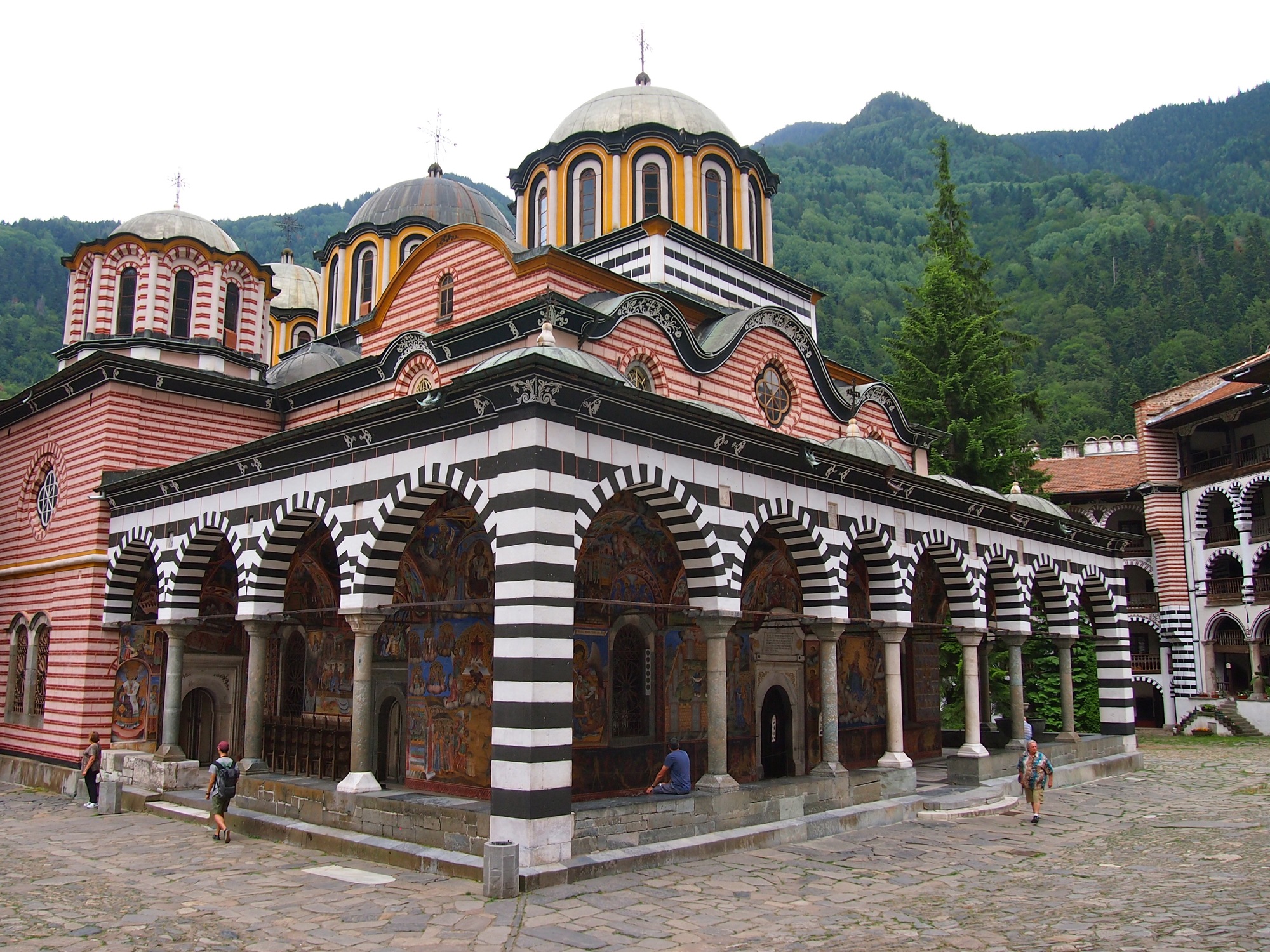
As the realization dawned on me that the bus I would be sitting on for 3+ hours had no air conditioning and was equipped with windows that didn't open, I was pretty sure I was going to be miserable.
This fact was compounded by 90+ degree heat, a packed bus, and a chain-smoking driver who kept dozing off behind the wheel as we zoomed along on twisty, narrow mountain roads up in the Bulgarian mountains.
Did I say miserable? Perhaps “fearful for my life and sanity” is more like it.
Yes, it's true that the ride from Sofia to Rila Monastery was less than pleasant. In fact, it probably ranks up there as one of the worst bus rides of my life.
But the payoff?
TOTALLY WORTH IT.
Rila Monastery
It was in college that I first heard of Rila Monastery.
It was mentioned in one of my favorite books, “The Historian,” which weaves real history together with a modern-day vampire tale. That book was about 99 percent responsible for my desire to go to Eastern Europe in the first place. Even before I had made concrete plans for my summer trip to Europe, I knew that Bulgaria was going to be included, just so I could visit Rila.
The monastery (which is officially called the Monastery of Saint Ivan of Rila) is the largest and most well-known Eastern Orthodox monastery in Bulgaria. Pilgrims and tourists come from all over the world to visit its painted church, arch-laden residential buildings, and museum. The surrounding mountain scenery is an added bonus.
The current monastery complex isn't actually all that old by European standards, but its namesake, the hermit Saint Ivan of Rila, lived in a nearby cave in the mountains in the 900s AD. The early monastic buildings were destroyed in a fire in 1833, and reconstructed over the next 30 years.
Today, the site is designated as a UNESCO World Heritage Site.
As soon as we arrived (and kissed the ground after that harrowing bus ride), I could immediately understand why this spot has been recognized by UNESCO.
The World Heritage organization recognizes Rila Monastery as “A characteristic example of the Bulgarian Renaissance (18th–19th centuries),” noting that “the monument symbolizes the awareness of a Slavic cultural identity following centuries of occupation.”
And what cultural identity there is!
Visiting Rila Monastery
The highlights of visiting Rila Monastery definitely are the courtyard and the Church of Rozhdestvo Bogorodichno with its yellow domes and exterior frescoes.
As you can see in my photos, when I say “exterior frescoes,” I mean exterior frescoes! The outside of the church is covered in striking, saturated frescoes. They were painted in the mid-1800s by a handful of Bulgarian artists, with the most famous being the Zograf brothers.
At first glance they look cheery, but you can find some pretty disturbing images, too, if you look closely.
These are contrasted by the serene, relaxed atmosphere that envelops the whole place. This is, after all, still a working monastery along with being a tourist attraction.
Along with touring the main church at Rila, you can also visit the Ecclesiastical & Historical Museum and the Icon Gallery, and grab lunch at the Restaurant Drushlyavitsa (just outside Rila Monastery's Samokov gate) or Rila Restaurant (part of the Tsarev Vrah hotel).
If you're staying overnight, there's also excellent hiking in the surrounding Rila Mountains.
Rila Monastery Tours
If you want to take a tour from Sofia (and avoid that terrible bus ride!), here are some options:
IF YOU GO…
Thinking of visiting Rila Monastery yourself? Here are some tips for your visit:
Getting there – If you don't have a car yourself and don't want to take a guided trip, the easiest (but not most pleasant) way to reach Rila Monastery is by public bus from Sofia. The ride takes roughly 3 hours one-way, with one bus transfer in the village of Rila. The tricky part is, there's only one bus per day from Sofia (leaving around 10:20 a.m.), and only one bus back (around 3 p.m.).
Pricing – Entry to Rila Monastery is free! The museum, however, requires a small entry fee. And donations, of course, are also accepted.
What to wear – Rila is still a functioning monastery, so modesty should be observed out of respect for the monks who call the place home. No mini skirts or short-shorts are permitted, and both men and women should cover their shoulders when entering the church. If you're deemed to be too exposed to enter the church, there are some cover-ups available for you to use.
Taking photos – You can take all the photos you want in the courtyard and of the frescoes on the outside of the church. Photos are NOT permitted, however, inside the church, the residential parts of the monastery, or the museum.
Where to stay – If you don't want to cram everything into one day, there are very basic, hostel-style rooms available to rent at the monastery. There's also the Hotel Tsarev Vrah just outside the monastery gates, which also offers very simple rooms. You can also look for hotels in Rila.
Just like the rest of Bulgaria, Rila Monastery isn't a place many people outside of Eastern Europe visit (yet). But I promise it's a site well worth the effort!
Would YOU want to visit Rila Monastery?
Pin it for later:
*Note: I visited Rila Monastery as part of a complimentary 18-day “Eastern Europe Explorer” tour with Intrepid Travel. But all opinions, as always, are entirely my own.

Amanda Williams is the award-winning blogger behind A Dangerous Business Travel Blog. She has traveled to more than 60 countries on 6 continents from her home base in Ohio, specializing in experiential and thoughtful travel through the US, Europe, and rest of the world. Amanda only shares tips based on her personal experiences and places she's actually traveled!






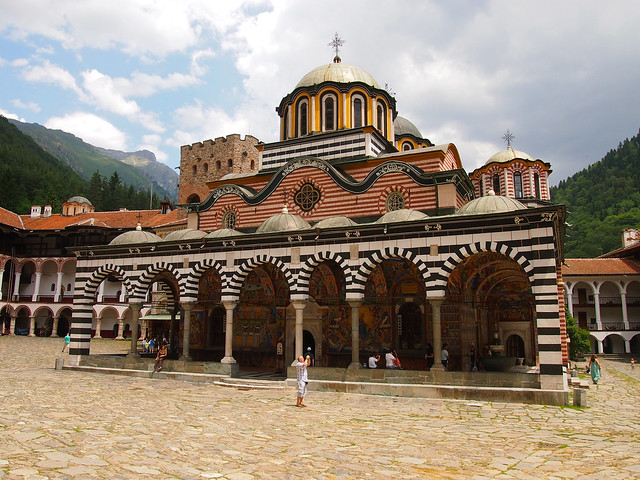



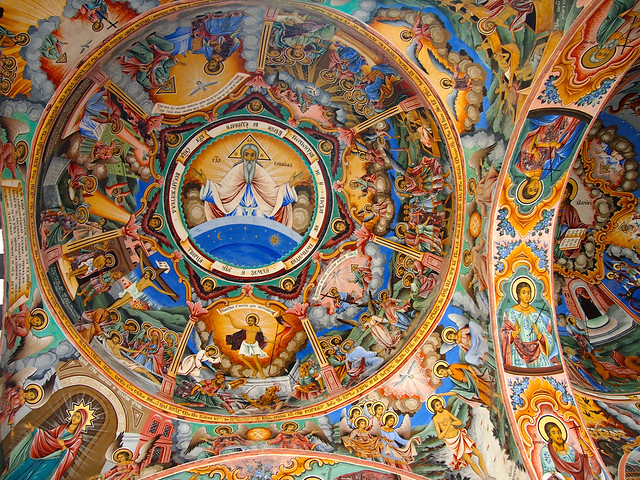

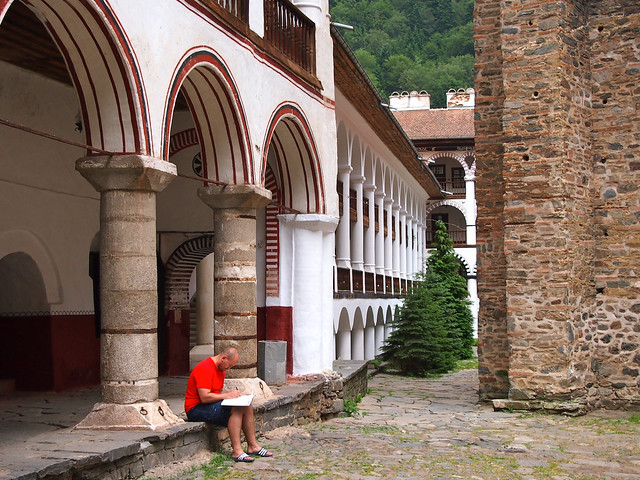


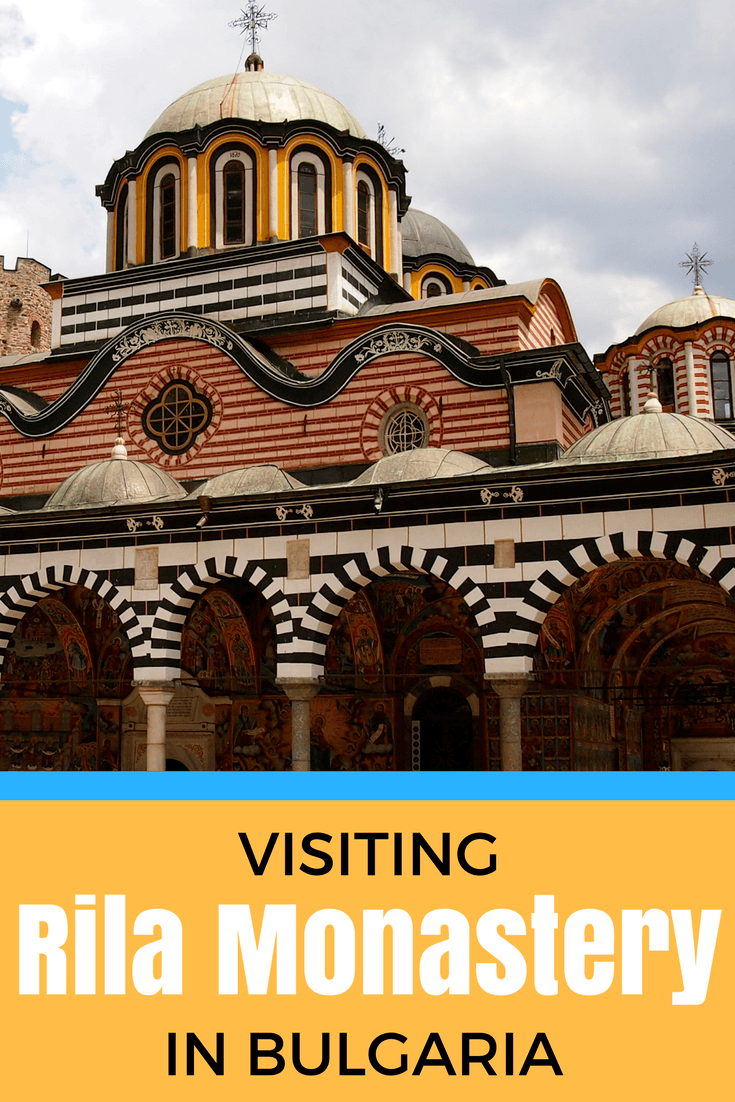









[…] Rila Monastery, Bulgaria (2012) […]
[…] to go to Bulgaria. I knew virtually nothing about the country, but I knew it was the location of Rila Monastery — a grand Orthodox monastery high up in the Rila Mountains that I read about for the first […]
been there, a real gem of Bulgaria 🙂
very nice photos!!
Thanks! I agree that’s its a true gem in Bulgaria – and one that most people (outside of the region, at least) have never even heard of!
God, I love Orthodox architecture.
Don’t you, though?? It’s so darn pretty; the photos basically take themselves!
Wow, A! What a beautiful place. Adding this to my list if I ever get to Bulgaria.
Definitely add it to that list! It’s not a place most people can say they’ve been. But yes, it is beautiful.
That place is so incredibly beautiful; some of the photos in this article would have been worthy candidates for your photo-of-the-week feature. I can’t imagine how long it took to paint those frescoes . . . And I also really like all the arches.
Oh, one or two of these may eventually end up in that coveted photo of the week spot! 😉
But yes, the frescoes and arches are all very pretty – and very photogenic!
This place is stunning! I’ve never heard of it before but it’s going on the list now.
It’s a good thing to put on any list. 🙂
What a wonderful place! But I think we’ll rent a car 🙂 You are the hero!
Haha, I would definitely suggest renting a car, or bargaining with a cab driver. That bus was the worst!
Wow it’s just so beautiful!!!! Great shots!
Thanks, Andi! It’s a true example of amazing Orthodox construction!
I’d never even heard of Rila Monastery before you started mentioning it in your travel posts and now it is DEFINITELY on my bucket list! 😀
Awesome to hear!! I love introducing people to new places/sights!
Amazing photos. Not sure my travels will get me to Bulgaria one day, but this is definitely a gorgeous place!
Well hopefully your travels DO take you there one day! 🙂
Great photos. I’m a photo junkie, so that’s important to me. After seeing your photos I think it’s high time I changed my old digital camera to something more professional for blogging. What camera do you use?
Did you know that:
“Besides breaking the ‘political monopoly’ of Byzantium in Eastern Europe,
Bulgaria broke also the monopoly of Latin, Greek and Hebrew as the exclusive
‘holy languages’ of Christendom. Along with introducing Christianity as a
common religion shared with Byzantium and Rome, Knyaz Boris I the Baptist
ensured the approval by both the Pope and the Patriarch of Constantinople that
the Church language in Bulgaria would be the spoken language of the country.
In Western Europe the holy books became accessible to the common people
much later, with Martin Luther’s 1534 Bible in German, and the 1611 King
James Version of the Bible in English.”
Thanks for those fun facts, Ele!
I’m glad you liked the photos. Right now I’m shooting with an Olympus E-PM1, and love it.
Those colors are So brilliant. Your Eastern Europe journey has me intrigued.
I knew the church was going to be colorful, but I didn’t realize just HOW colorful it would be!
If you’re considering a trip to Eastern Europe, I highly, highly recommend it!
Maybe after the ITB Berlin.
Beautiful beautiful artwork. Nicely photographed and described, Amanda!
Thanks, Henry! I really, really loved this place!
I’m dying to go to Eastern Europe and The Historian is almost 100% responsible for that! For now, I’ll live vicariously through you and your awesome pics.
Ooo, another Historian fan, yay! I visited almost every place mentioned in that book this summer. And it was awesome.